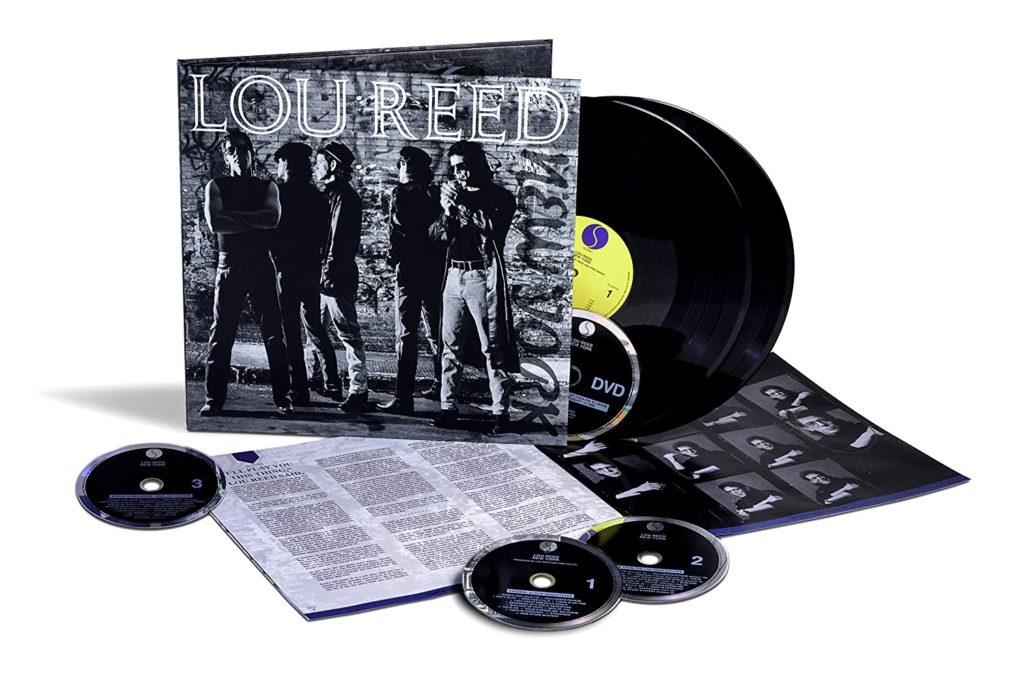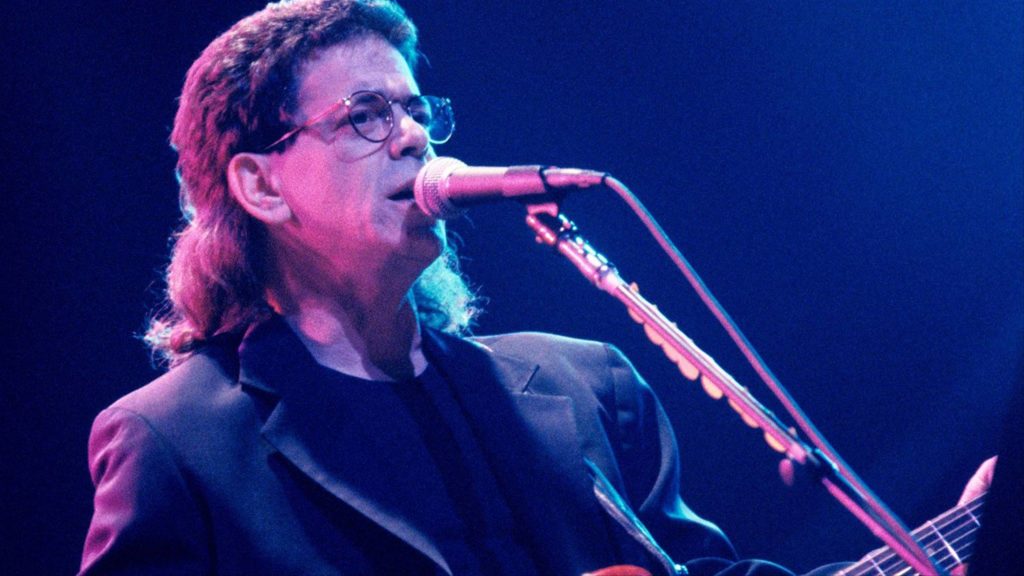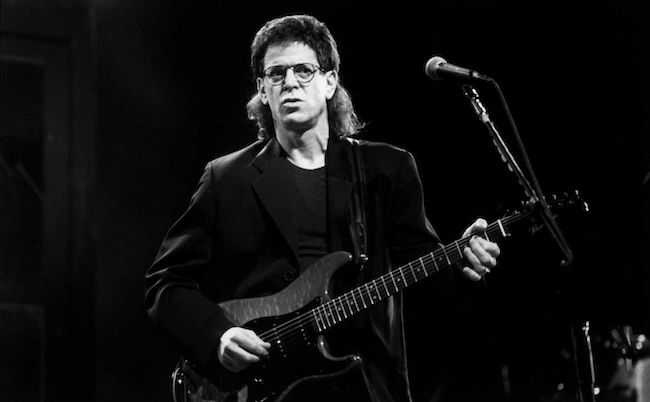 “My Way” isn’t exactly Lou Reed’s kind of music, but Paul Anka’s lyrics for that song do a pretty good job of limning the attitude that characterized his half-century career. In the early 1960s, Reed came up with a radically different idea for what rock music should sound like, and he continued to blaze new trails without a hint of compromise until his death on October 27, 2013. In 1964, he cofounded the Velvet Underground, one of rock’s most influential bands, which sounded like nothing like any contemporaneous artists were producing, and he went on to enjoy a wild-ride solo career that included everything from a double album of dissonant guitar feedback (Metal Machine Music) to a concert LP on which he attacked music critics by name (Live/Take No Prisoners) and a Top 20 single that slipped in a reference to oral sex (“Walk on the Wild Side”).
“My Way” isn’t exactly Lou Reed’s kind of music, but Paul Anka’s lyrics for that song do a pretty good job of limning the attitude that characterized his half-century career. In the early 1960s, Reed came up with a radically different idea for what rock music should sound like, and he continued to blaze new trails without a hint of compromise until his death on October 27, 2013. In 1964, he cofounded the Velvet Underground, one of rock’s most influential bands, which sounded like nothing like any contemporaneous artists were producing, and he went on to enjoy a wild-ride solo career that included everything from a double album of dissonant guitar feedback (Metal Machine Music) to a concert LP on which he attacked music critics by name (Live/Take No Prisoners) and a Top 20 single that slipped in a reference to oral sex (“Walk on the Wild Side”).
 One of the greatest highlights of Reed’s solo years is 1989’s nearly hour-long New York, which received a dramatically expanded edition in 2020. The album, which at the time of its original release was his first new offering in three years, introduced a band that included Reed’s then brother-in-law, guitarist Mike Rathke, bassist Rob Wasserman and drummer Fred Maher. The musicianship is excellent, but the music and lyrics are even better.
One of the greatest highlights of Reed’s solo years is 1989’s nearly hour-long New York, which received a dramatically expanded edition in 2020. The album, which at the time of its original release was his first new offering in three years, introduced a band that included Reed’s then brother-in-law, guitarist Mike Rathke, bassist Rob Wasserman and drummer Fred Maher. The musicianship is excellent, but the music and lyrics are even better.
People say write about what you know, and man, did Reed know New York’s undercurrents, which serve as the subject of some of this album’s best tracks. The record opens with “Romeo Had Juliette,” a song about a couple the singer calls Romeo Rodriguez and Juliette Bell that would fit well alongside Bruce Springsteen’s “Incident on 57th Street” and “New York City Serenade.” Other vignettes include “Halloween Parade,” about the gay community’s annual Greenwich Village event and the lives lost to AIDS; and “Dirty Blvd.,” a number about welfare hotels in which Reed sings, “No one here dreams of being a doctor or a lawyer or anything/They dream of dealing on the dirty boulevard/Give me your tired, your poor/I’ll piss on ’em/That’s what the Statue of Bigotry says.”
Many of the other songs don’t relate specifically to New York, but the lion’s share of them sound more political than anything Reed had previously released. He directly addresses subjects ranging from abortion, child abuse and homelessness to guns, pollution and slum lords, and he references such names as Jesse Jackson, Bernhard Goetz, Louis Farrakhan, Rudy Giuliani and Kurt Waldheim.
Moreover, his acidic lyrics often seem remarkably relevant to today’s world. Consider songs like “Sick of You” (“The ozone layer has no ozone anymore”), “Strawman” (“Does anyone need a $60,000 car?/Does anyone need another President or the sins of Swaggart parts 6, 7, 8, and 9?”) and “Busload of Faith” (“You can depend on cruelty, crudity of thought and sound/You can depend on the worst always happening/You need a busload of faith to get by”).
It’s not all politics, though. There’s a witty and sardonic rant about having children (“Beginning of a Great Adventure”), for example, and a number dedicated to Reed’s old pal Andy Warhol (“Dime Store Mystery,” which also appears on 1990’s Songs for Drella, the Warhol tribute album Reed made with John Cale).
Related: When Lou Reed met Metallica
New York isn’t nearly as bleak as many of its lyrics might suggest, thanks to the music. It’s consistently rhythmic, energized and infused with biting guitar work. And there’s frequent evidence throughout of Reed’s love of early rock and roll. He even enlists Dion DiMucci to sing backup on “Dirty Blvd.” and throws in a quote from Mickey and Sylvia’s 1957 pop hit, “Love Is Strange,” in “Beginning of a Great Adventure.”
The new edition of New York is as good as any fan could have hoped for. It includes an excellent remaster of the 1989 release on a CD and a pair of vinyl albums; a CD that offers often-fascinating rough mixes, early and single versions and excellent concert readings of “Walk on the Wild Side” and “Sweet Jane”; and a CD with a live rendition of New York culled from concerts in the U.S., U.K. and Denmark. You also get an oversized booklet containing extensive notes, photos and lyrics for all the songs.
Last but not least, there’s a DVD that presents high-resolution audio of the original album, a revealing Reed interview, and a video of another New York performance, this one from a Montreal show that had previously been available only on VHS and Laserdisc. Needless to say, this 1989 recording is not hi-def, but the audio and video quality are both excellent, all things considered, and the performance is first rate.
Listen to “There is No Time” performed live
[easy_sign_up title=”Sign up for the Best Classic Bands Newsletter”]

